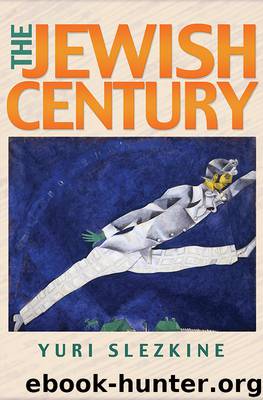The Jewish Century by Slezkine Yuri

Author:Slezkine, Yuri
Language: eng
Format: epub
Publisher: Princeton University Press
Published: 2004-03-12T05:00:00+00:00
Most members of the new Soviet elite were not Jews, and most Jews were not members of the new Soviet elite. But there is no doubt that the Jews had a much higher proportion of elite members than any other ethnic group in the USSR. In absolute terms, they were second to the Russians, but if one divides the elite into groups whose members came from the same region, shared a similar social and cultural background, and recognized each other as having a common past and related parents, it seems certain that Jews would have constituted the largest single component of the new Soviet elite, especially (or rather, most visibly) its cultural contingent. They tended to be the poets, the prophets, and the propagandists. According to David Samoilov, a member of the Kogan generation who was born in Moscow to a Jewish doctor from Belorussia and went on to become one of the most eloquent chroniclers of the Soviet cultural elite, Jews had filled “the vacuum created by the terrorist regime” and then graduated from a “social stratum” to become a “part of the nation.” The Jews, he believed, represented “a certain kind of mentality, a branch of the Russian intelligentsia in one of its most selfless variants.”46
In effect, the role of the Jews in the prewar Soviet Union was similar to the role of the Germans in imperial Russia (or the role of Phanariot Greeks in the Ottoman Empire, among other instances). Mercurian nations in cosmopolitan empires, they represented modernity and internationalism among Apollonians doomed to becoming Mercurians. Closely associated with Mercurianizing regimes at their inception, they were used by those regimes as models, missionaries, surrogates, eager converts, and incorruptible officials. Both the tsar’s Germans and the Soviet Jews identified themselves with their states because they shared those states’ goals, were good at implementing them, and benefited tremendously from both their loyalty and their ability (for as long the regimes remained cosmopolitan). Both served as bureaucrats, elite professionals (including scholars), and leading officials in those most Mercurian of all state functions: diplomacy and the secret service. The Russian Germans were traditional Mercurians who tended to maintain their external strangeness and internal cohesion as a prerequisite for the continued performance of their mediating roles. The Soviet Jews were moderns who had abandoned traditional Mercurianism in order to overcome their strangeness and create a society that would dispense with all forms of mediation—only to find themselves performing traditional Mercurian functions almost identical to those of their imperial German predecessors (and in many ways similar to those of their own grandparents in the German and Polish lands).
One crucial difference (which was probably due to the unplanned and unpremeditated nature of the Jewish transformation into specialized Soviet Mercurians) was the much greater proportion of Soviet Jews (compared to the Russian Germans) among those who thought of themselves as members of the Russian intelligentsia. In imperial Russia, there was a distinction, largely inconsistent but always insisted upon, between the prophetic spokesmen for the country’s
Download
This site does not store any files on its server. We only index and link to content provided by other sites. Please contact the content providers to delete copyright contents if any and email us, we'll remove relevant links or contents immediately.
| Africa | Americas |
| Arctic & Antarctica | Asia |
| Australia & Oceania | Europe |
| Middle East | Russia |
| United States | World |
| Ancient Civilizations | Military |
| Historical Study & Educational Resources |
Cecilia; Or, Memoirs of an Heiress — Volume 1 by Fanny Burney(32546)
Cecilia; Or, Memoirs of an Heiress — Volume 2 by Fanny Burney(31945)
Cecilia; Or, Memoirs of an Heiress — Volume 3 by Fanny Burney(31930)
The Secret History by Donna Tartt(19052)
Sapiens: A Brief History of Humankind by Yuval Noah Harari(14368)
Leonardo da Vinci by Walter Isaacson(13316)
The Radium Girls by Kate Moore(12018)
Sapiens by Yuval Noah Harari(5366)
How Democracies Die by Steven Levitsky & Daniel Ziblatt(5215)
The Wind in My Hair by Masih Alinejad(5092)
Homo Deus: A Brief History of Tomorrow by Yuval Noah Harari(4908)
Endurance: Shackleton's Incredible Voyage by Alfred Lansing(4769)
Man's Search for Meaning by Viktor Frankl(4583)
The Silk Roads by Peter Frankopan(4526)
Millionaire: The Philanderer, Gambler, and Duelist Who Invented Modern Finance by Janet Gleeson(4465)
The Rape of Nanking by Iris Chang(4203)
Joan of Arc by Mary Gordon(4101)
The Motorcycle Diaries by Ernesto Che Guevara(4089)
Stalin by Stephen Kotkin(3957)
